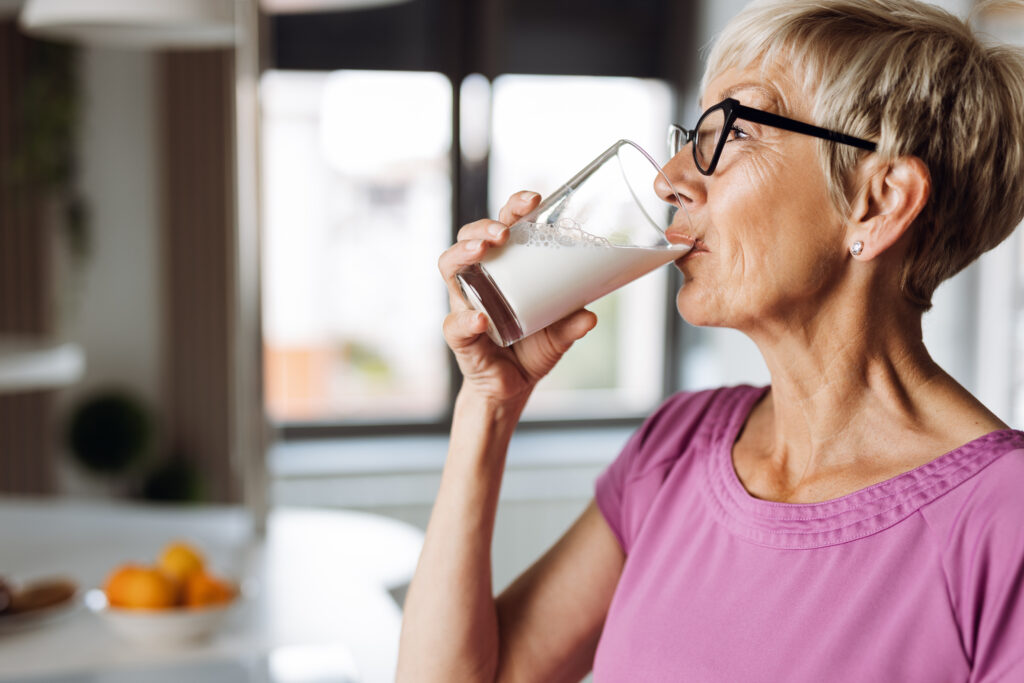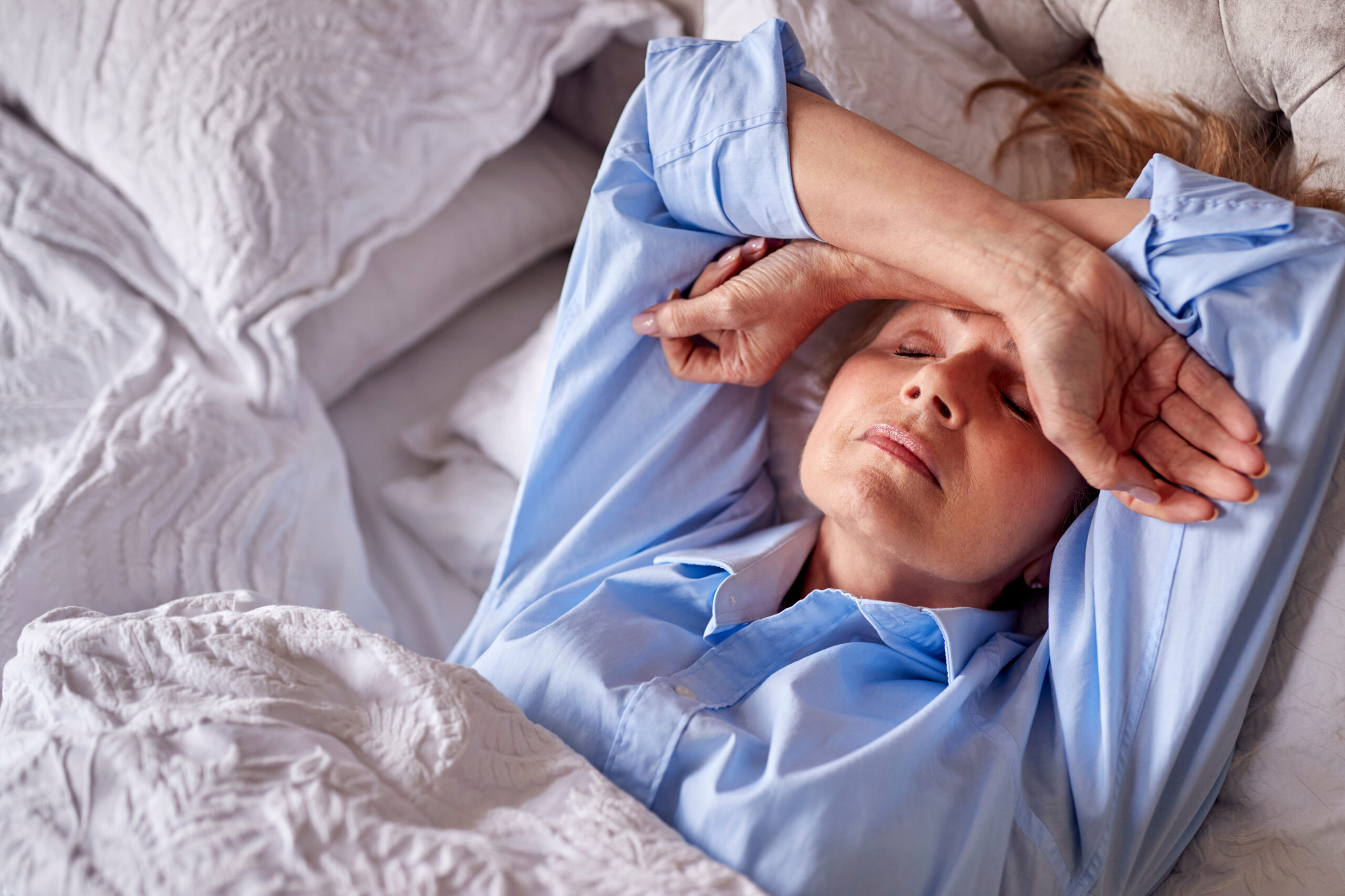
Many women between 45 and 60 desire better sleep during menopause.
One of the most common and frustrating symptoms of menopause is sleep disturbances. This can show up as trouble falling asleep at first, waking up during the night, or rising earlier than you’d like.
Quality sleep is vital for good health, so it’s helpful to understand how menopause might impact sleep and recognise these changes for better management.
Here, we delve into menopausal sleep changes and offer evidence-based tips on improving your quality of sleep during this important transition.
Understanding Sleep Problems During Menopause
Sleep problems are common around menopause, particularly for women in perimenopause. Around 50% of women report sleep problems during perimenopause.
Sleep disturbances can involve:
- Difficulty falling and staying asleep
- Early morning and nocturnal awakenings
Menopausal symptoms, such as hot flushes or night sweats, may contribute to poor sleep. But even women who don’t have hot flushes or night sweats report having sleep issues during perimenopause.
Sleep problems in perimenopause and menopause may also be driven by:
- Hormonal changes
- Mental health concerns
- Your sleep habits
- Other lifestyle factors (like late-night screen use)
Over time, disrupted sleep can affect your wellbeing, making managing day-to-day life much harder.
Generally, sleep problems start to get worse in early perimenopause and are highest in late perimenopause. The good news is that sleep issues often don’t last!
As women get further past menopause, we tend to sleep longer.
Tips for Enhancing Sleep Quality

Experts recommend that adults aim for 7-9 hours of sleep each night. Unfortunately, the average adult is getting only 6-7 hours of sleep. So, how can we improve sleep length and quality?
Experts suggest three key strategies to improve sleep: optimising your bedtime routine, reducing sleep-disrupting foods, drinks and activities, and incorporating more exercise and relaxation techniques. Let’s dive deeper.
1. Establish a relaxing bedtime routine
Your bedtime habits could be the key to a better night’s sleep.
- Establish a consistent sleep schedule by going to bed and waking up at the same time every day.
- If possible, try to avoid napping in the late afternoon or evening, as it might disrupt your sleep at night.
- Create a cozy sleep environment by keeping your bedroom at a comfortable temperature — not too hot and not too cold — and make sure it’s as quiet as possible.
- Consider developing a nurturing bedtime routine; many find it helpful to read a book, listen to calming music, or enjoy a warm bath before settling down for the night.
2. Limit sleep-disrupting foods, drinks and activities
There’s more to limit than simply cutting back on coffee:
- Try to avoid eating large meals too close to bedtime.
- Consider cutting back on caffeine. Aim to keep it under 300-400 mg daily, where a cup of coffee is about 100-200 mg. A handy tip is to steer clear of caffeine (including tea, chocolate, and soft drinks like cola) after 2pm.
- Even small amounts of alcohol can make it harder to stay asleep, so it’s wise to skip it near bedtime.
- Limit your screen time right before bed — avoiding television and using your computer or mobile device in the bedroom can help. The light from these devices might make it tougher for you to drift off into a peaceful sleep.
3. Improve exercise and relaxation habits for better sleep
Try to exercise at regular times each day, but aim to finish well before bedtime for better sleep quality.
Natural Remedies for Better Sleep

In traditional medicine and nutrition, there are well-known foods and herbal remedies that promote sleep and improve sleep quality.
Sleepy-time foods
There are a number of evidence-backed, sleep-promoting foods that are good to eat at your evening meal.
- Tart (or sour) cherries are one of the best food sources of melatonin (a sleep-promoting compound). Tart cherries have a higher concentration of melatonin than sweet cherries.
- Milk from animals is a well-known traditional sleep aid. One of the reasons it works is because it is rich in melatonin. Milk also contains tryptophan, an important ingredient for melatonin production.
- Fatty fish, such as salmon and tuna, are decent dietary sources of melatonin. Fish also contain vitamin D and omega-3s that may assist your body to make a chemical called serotonin, that also plays a role in sleep quality.
- Some grape varieties, especially red and purple grapes, contain melatonin. Grape skin contains more melatonin than the flesh.
- Nuts may also be of benefit for sleep. Pistachios and walnuts have been shown to have the highest melatonin levels of all the nuts.
- Kiwi fruit and rice have also been shown to aid relaxation and sleep.
Traditional herbal sleep remedies
There are a variety of traditional herbal remedies that have been used as sleep or calming aids, some for hundreds of years. These include:
- Valerian: A herb used for anxiety and insomnia, known for its sedative effects.
- Hops: Flowers from the hop plant, used in beer and for their calming effects that promote relaxation and sleep.
- Kava: A beverage from the kava root, noted for its sedative properties, used to reduce anxiety and enhance well-being.
- Chamomile: A flowering plant in herbal tea, known for calming effects and aiding sleep.
Sleep by Remifemin combines valerian and hops, which are traditionally used in Western Herbal Medicine to:
- Induce sleep
- Relieve restlessness
- Calm or relax the nervous system

Menopause can greatly impact sleep, stopping you from falling or staying asleep. Adopting some of the practical tips above can improve sleep quality. Try to maintain a consistent bedtime routine, limit disruptive foods and drinks, and incorporate more exercise and relaxation techniques in your daily life. Natural remedies like certain foods and herbal supplements like Sleep by Remifemin may also promote better sleep.





